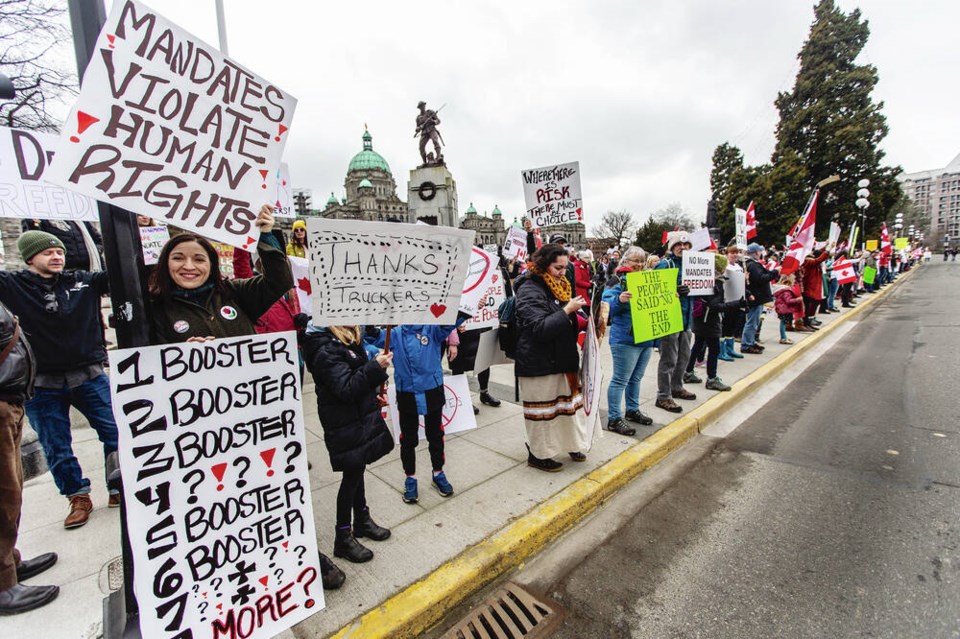Like Howard Beale in the 1976 movie Network, I’m as mad as hell, and I’m not going to take this anymore!
What has so irked The Dave? Well, country music, for one thing. And the awful road over the Malahat.
And people — not naming names, but it’s my wife — who insist on sleeping with the bedroom window open even during the winter months.
There are millions of things about which to be outraged!
The first thing you want to do when protesting is to find something really good to protest.
You want something to feel deeply, personally aggrieved about. I mean an issue or movement or bike lane bollard that negatively affects you on a visceral level and requires immediate, powerful action!
Failing that, maybe just something you heard from a YouTube influencer this morning while going to the bathroom.
Examples of deeply personal grievances that we can all get behind at a moment’s notice include:
• the Middle East (religion, oil reserves, hummus recipes)
• municipal fountains
• guv’ment policies truck drivers don’t like
The first step in planning an official protest is to assemble, just like superheroes in the Avengers movies!
Gather like-minded people, whether in costume or not — but probably not is best — and agree on why protest action is necessary.
Don’t worry about making any sense at this early stage, but do remember to exchange contact information to keep everybody updated throughout the planning process and/or to secretly give to Crown counsel during your eventual plea deal when this all spins out of control and you face quite a bit of jail time.
Step two is to define, which refers to carefully articulating the goals you hope to accomplish, such as speaking truth to power, overturning the state, or meeting girls.
You want to define the message you wish to convey, and the audience you seek to reach. This is the time to decide on whether or not to manufacture a crisis, such as “cellphones and school children,” and just how far you are willing to go to advocate for/against things you don’t know much about.
Tone is important, because if your protest leans too much toward entertainment and feel-good sentiment, people may listen to you and be persuaded, robbing you of your chance to be publicly angry and shouty.
On the other hand, if your tone is too dire and frightening, people may think you are out selling memberships in the B.C. Conservative party and laugh at you.
Step three is research, which is sometimes called “know your rights.”
The first thing to research is which country you currently live in and are a citizen of. Please excuse the dangling participles, I did not eat enough fibre today.
Anyway, this step is important because there are a lot of “rights” to do this or that mentioned on American television shows that may not be relevant to you.
Under section 2 of the Canadian Charter of Rights and Freedoms, we are free to follow the religion of our choice, and are guaranteed freedom of thought, belief and expression, even when it is patently stupid.
Our right to gather and act in peaceful groups is also protected, as is our right to belong to an association like a trade union or roller derby team.
The Charter is one part of the Canadian Constitution, a set of laws containing the basic rules about how our country operates on sunny days when the wind is behind us.
The important thing to remember is that we are Canadians and live in Canada. The United States of America is a different country.
I can’t stress this enough.
Step four is to prepare, which means make sure your protest complies with time, space and electromagnetic/gravitational constant restrictions.
Decide on a specific date, time and place. Sometimes these are determined for you. For example, if you are protesting Christmas, you are pretty much limited to Dec. 25, and either Bethlehem or Santa’s Workshop, the North Pole, depending on what your parents told you.
It’s a good idea not to hold a protest event during bad weather, i.e. any time between mid-September and the May long weekend, nor on any date that conflicts with a Taylor Swift concert/Super Bowl game.
If you are planning a counter-demonstration event, meaning your protest is to protest other people’s protest, keep things peaceful and respectful.
Don’t block doors or physically prevent other demonstrations from taking place by gluing yourself to the road, chaining yourself to a mother grizzly bear, or playing pickleball in James Bay.
Finally, publicize! You need to get the word out, because just you standing there shouting about something is less of a protest, and more of a “crazy person.”
Also, a large turnout with media presence and a crowd of onlookers brings more attention to your protest, and the opportunity to sell T-shirts and hotdogs. You might even be seen on Canadian cable television news, and thus have direct access to important decision-makers in their late 70s!
Of course, the downside of always being as mad as hell and not going to take this anymore is that you tend to miss out on being thankful for how wonderful life is.
Sure, okay, okay OKAY, it’s far from perfect; the falcon cannot hear the falconer; the blood-dimmed tide is loosed; upsetting hoo-ha abounds; and all that jazz…
But look around. So, too, does grace and mercy and kindness and love and joy. Think on these things.
>>> To comment on this article, write a letter to the editor: [email protected]



